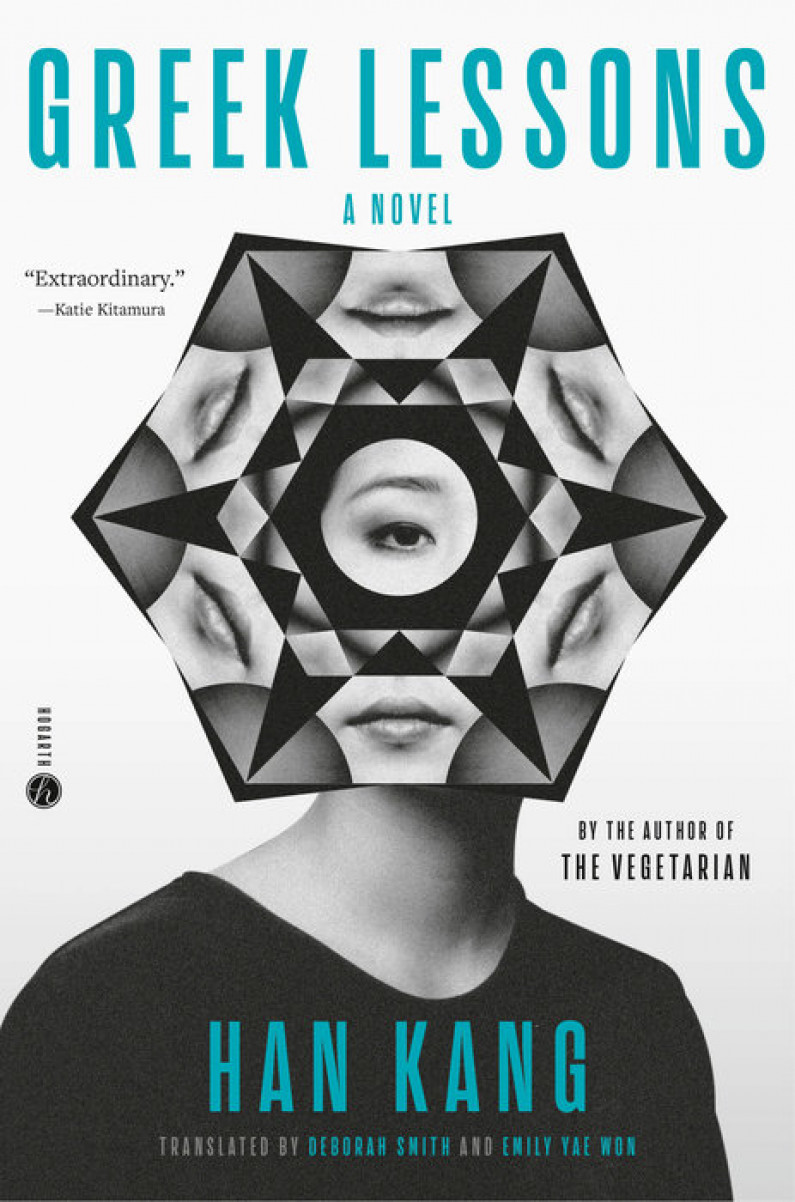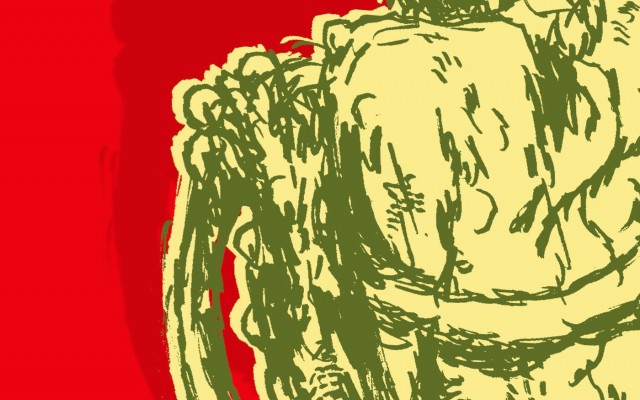Review: Greek Lessons

Greek Lessons
By Han Kang, translated by Deborah Smith and Emily Yae Won
Hogarth, 192 pp., $26.00 (hardcover)
Review by Marie Lambert
At the beginning of Greek Lessons, one of the novel’s two unnamed protagonists reflects on the epigraph inscribed on the reverse of Jorge Luis Borges’ grave in Geneva, an excerpt from an ancient Norse epic that describes a man and woman lying next to each other with a “blue steel blade” between them. The unnamed protagonist interprets this as a profoundly personal admission on Borges’ part: a textual symbol of the blindness to which the Argentine writer succumbed late in life. Han Kang’s Greek Lessons is filled with instances of similarly intimate disconnection, of bodies and beings striving to push their faculties beyond the abysses that mark the borders of how we come to know the world.
At the crux of Han’s novel are a man and a woman — unnamed and respectively, a teacher and student of ancient Greek — both residing in Seoul. Although they appear on opposing ends of the classroom’s dyadic structure, the two nonetheless stand in shared positions: each of them holds a secret that severs them from the world. For the woman, a poet and former teacher herself, it is her inability to speak, an inexplicable phenomenon that had befallen her only once before in adolescence. This sudden withering of her verbal command of language (writing remains accessible) is the third blow in a triptych of loss, following the recent death of her mother and the success of her ex-husband’s battle to retain full custody of her young son. On the other side of the classroom, the Greek teacher takes pains to hide his steadily encroaching blindness, conducting lessons from memory alone, each day writing declensions and conjugations he cannot read on a chalkboard he can barely see.
In chapters that alternate irregularly between the two characters’ perspectives — his in the first person, hers in the third — Han spools out the intractable circumstances that have brought them together, that have led them each to seek out this ancient, dead language, and brought them to the margins of their modern social world. The woman, grappling with the loss of speech as well as her son, has turned to the cold domain of a dead language in order to find her way back to her native tongue. After decades living in Europe, following an expatriate childhood in Germany, the man has returned to the country of his birth on the eve of the total degradation of his vision. Resolving to live out his days in a Seoul now foreign to him, he drifts through the routine of teaching buoyed by dread and denial, preparing for the darkness to close around him.
The novel is rife with this kind of tortured, aporetic situation — paradoxes, dilemmas, profound and impossible decisions — that are so common to Greek tragedy. As a young man, the Greek teacher, already haunted by the congenital blindness awaiting him, falls in love with someone with whom he can only communicate by sign language — their relationship fatally overshadowed by the impending loss of the visual world that is the basis for all of their communication. The woman, although a linguistic autodidact and precocious reader from a young age, finds herself increasingly uncomfortable with the mechanics and raw materiality of speech, disturbed by the tendency of meaning to corrupt, intention to dissolve into misapprehension.
Instances of miscommunication pervade at every turn, as each protagonist is wracked, albeit differently so, by their desire to address an other — any other — who always appears inaccessible. Chapters from the Greek teacher’s perspective are largely structured as letters — to his young love, a sister an ocean away, an old friend — many of whom, we learn, will never arrive. Late at night, the poet-divorcée makes despairing pay-phone calls to her ex-husband, straining to make her silence carry the weight of her grief and rage. In the first significant meeting between the two protagonists, the Greek teacher supposes that his silent student is deaf and attempts to engage with her in the sign language he’d used with his former beloved — an effort doubly abortive, given that he knows only German, not Korean, sign language.
It is perhaps in response to this — the ineluctable tragedy of expressing oneself to another — that the two are drawn to ancient Greek, a language that one embarks upon learning with the knowledge that fluency is virtually impossible, pragmatic communication moot. Indeed, for both the Greek teacher and his student, the absolute alterity of the ancient language is precisely what makes it attractive. For the teacher, growing up as an expat in Germany, ancient Greek was a “safe, quiet room,” a venue where he could escape the “conspicuousness” of living as an East Asian among the white European majority. The woman, meanwhile, seeks in the ancient language a means of breaking the ice that has formed over her ability to phrase in her mother tongue. Whereas in her youth, it was the shock of a foreign word — “bibliothèque” — that returned her to Korean, she feels now that more extreme measures, including the distance of an unfamiliar script, are warranted.
Although she attests that any ancient language would have served her efforts, the poet nonetheless finds herself fascinated with the complex and uniquely “self-sufficient” structure and grammar of ancient Greek:
The verbs change their form according to, variously: the subject’s case, gender and number; the mood; the tense, of which there are various grades; and the voice, of which there are three distinct types. But it is thanks to these unusually elaborate and meticulous rules that the individual sentences are, in fact, simple and clear. There is no need to specify the subject, or even to keep to a strict word order. This one word — modified to denote that the subject is a singular, third-person male; the tense perfect, meaning it describes something that has occurred at some point in the past; and the voice middle — has compressed within it the meaning “He had at one time tried to kill himself.”
The elegant economy of Greek’s phrasal structure — its capacity to compress a whole complex of meaning into a single word or phrase — is indeed reminiscent of Han Kang’s own novelistic style. Her prose, rendered in English here by Deborah Smith and Emily Yae Won, is at once understated and intensely imagistic. The narrator’s eye pans across characters’ bodies and psyches, drawing out telling details with a measured but exacting focus. For the neutral tone, Han’s simple images are weighty, dense with the occluded meaning compressed within each flutter of an eyelid, each tug of a shirtsleeve over a pale wrist.
She bends her head over the book that lies open on the desk. It's a thick dual-language edition of the first few books of The Republic, containing both the original Greek and the Korean translation. Drops of sweat trickle down from her temples and fall on to the Greek sentences. The coarse-grained recycled paper bulges where they land. When she raises her head, it seems as though the dimly lit classroom has suddenly brightened, unsettling her.
A propensity for sentence fragments lends a poetic cadence to the text, which reads at times like Imagist verse pressed flat into justified prose lines. For the precision of Han’s images, a certain ambiguity suffuses the work, particularly around who is speaking — and to whom — at any given time. Despite the clear alternation between first- and third-person chapters, the Greek teacher is never explicitly named as the owner of the first-person voice. Later, in a significant scene that finds the teacher and student again struggling to communicate, the narrative dips out of omniscient third into italicized first-person paragraphs that alternate between the two without attribution.
Some degree of ambiguity is not an uncommon feature of translated Korean writing. Moreover, couched in a work that is so closely concerned with the paradoxically intimate and alienating features of language, these moments of unclarity in Smith and Yae Won’s translation take on thematic resonance.
A key force in conveying this paradox is, of course, the presence of the ancient Greek language itself. Given the hereditary links between English and Greek, it would be only too possible to dilute some of the raw alterity that the ancient language holds for the Korean speakers in the novel’s translation. Yet whenever Greek appears on the page, its foreignness is rightly preserved, unbroken by the unwitting inclusion of any partial cognates. Any familial resemblance to English is absent in these stark phrases, ancient syllables left in their uncanny script.
παθεῖν
μαθεῖν
“These two verbs mean ‘to suffer’ and ‘to learn.’ Do you see how they’re almost identical? What Socrates is doing here is punning on these words to remark on the similarity of the two actions.”
Compared to the dark overtones of other volumes of Han Kang’s fiction available in English — i.e. The Vegetarian and Human Acts — Greek Lessons is relatively restrained. For the physical limitations and psychological torment the characters suffer, violence is largely kept offstage. The novel indeed seems to try to discourage us from ascribing a certain flattened notion of “trauma” as the cause of the woman’s silence. Early in the novel, after a therapist suggests that long-buried childhood anxieties, combined with the recent toll of her mother’s death and loss of her son, are at the root of her aphasia, the woman is unimpressed. “No. It isn’t that simple,” she writes on a notepad in what becomes their final session.
What Han’s novel suggests instead is that to suffer a profound severance from the world is the rule, not the exception. While the two protagonists are acutely aware of their relative alienation from conventional means of connection and expression, few other characters fare better.
This is, in essence, the unstated lesson of the ancient Greek classroom. To learn a “dead” language is a necessarily asymptotic experience: for all the ostensible acuity one gains through rigorous, even life-long study, the gap between the present and the radical foreignness that is antiquity can never be absolutely bridged. The alterity that Han’s novel portrays here is only a slice of the profound aporia that looms over the language called “ancient Greek” (more specifically known as Attic, or Athenian Greek, of the fifth century BCE, elevated retroactively to an anachronistically nationalist title and authority by modern scholars). To recognize the futility of dedicating oneself to Greek, of giving voice to the ancient dead, is also an invitation to confront the asymptotic nature of communing in and living with any language at all.
As Han tells it, this lesson is neither nihilistic nor despairing. It is to recognize that we are all mutilated by the systems of sense, including and especially language, that make our worlds. We are all speaking with our mouths behind our hands, but nonetheless, something always slips out.
–
Marie Lambert is a writer, educator, and occasional academic based in Brooklyn, New York. A graduate of Amherst College, she received her doctorate in Comparative Literature from Cornell University. Her writing — popular, academic, and ghost — has appeared in various print and digital outlets. You can reach her at www.marie-lambert.com.


